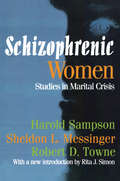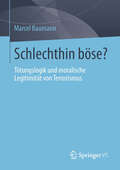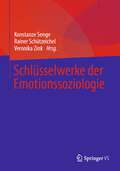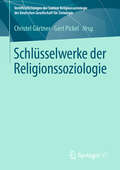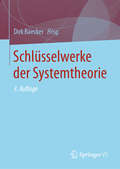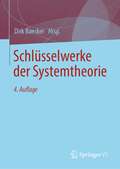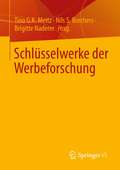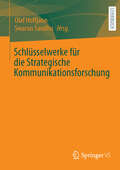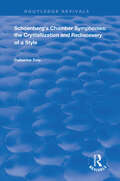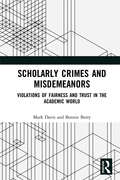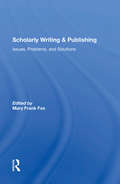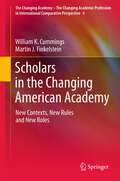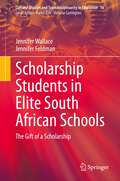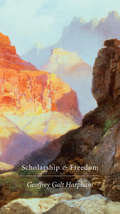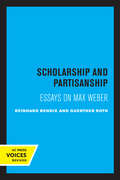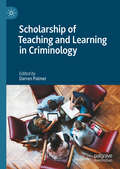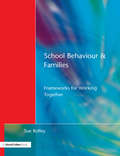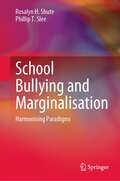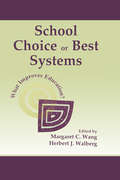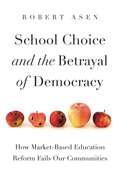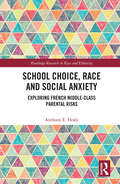- Table View
- List View
Schizophrenic Women: Studies in Marital Crisis
by Harold Sampson Sheldon L. Messinger Robert D. TowneSchizophrenic Women is a fascinating report on the lives of seventeen families that suffered the experiences associated with the hospitalization of the wife and mother for mental illness. A description and analysis of representative experiences is presented here in an attempt to investigate various key issues--the patterns of family living preceding the crisis leading to medical hospitalization; how the patterns fell apart; how personal and family crises became psychiatric emergencies; how the hospital experiences modified both the immediate crises and the earlier patterns of living--and how durable those changes were once the patients had returned home. The book goes beyond the immediate lives of the women and their families--the authors direct attention to patterns of psychiatric care and to the ways in which such crises as those experienced by these women and their families come to professional attention and are managed. The authors explore how help is found and used and some of the functions hospitalization serves for patients and their families. They point out some of the ways that traditional patterns of psychiatric care limit the power to observe, understand, and effectively influence a pathological course of events. In her new introduction to Schizophrenic Women, Rita J. Simon notes that, "Although the study was conducted in the 1950s, readers will recognize its current relevance and importance for scholars and the lay public interested in the problem of mental illness and intrafamily relationships."
Schlechthin böse?: Tötungslogik und moralische Legitimität von Terrorismus
by Marcel BaumannGlobale Phänomene wie politische Gewalt oder Terrorismus zu verstehen, ist eine große Herausforderung. Dieses Buch leistet hierzu einen Beitrag, indem die Problematik der Legitimität und Legitimation von Gewalt in den Mittelpunkt gestellt wird. Die Frage, unter welchen Bedingungen Gewalt legitim ist, wird aus der Perspektive der Gewaltakteure gestellt. Denn Legitimität ist keine für immer garantierte Eigenschaft, sondern sie muss stets aufs Neue geschaffen werden. Deshalb müssen sich "Terroristen" permanent der legitimitätssuchenden Selbstverständigung stellen: die Rechtfertigung des eigenen Gewalthandelns in den Augen der Gemeinschaft. Die Analyse möchte dazu beitragen, politische Gewalt anders sehen zu lernen. Sie ist interdisziplinär angelegt, indem sie Politische Philosophie, verstehende Soziologie und Moralphilosophie integriert.
Schlüsseltexte der ‚Neuen Rechten‘: Kritische Analysen antidemokratischen Denkens (Edition Rechtsextremismus)
by David MeieringMit Begriffen, Bildern und Theorien arbeitet die ‚Neue Rechte‘ an der kulturellen Hegemonie. Ihre Diskursarbeit inszenieren sie als gefährliches, dunkles Denken. Der vorliegende Band entmystifiziert diese Selbstdarstellung, indem er ihre ‚Schlüsseltexte‘ kritisch liest, dechiffriert und in den Kontext antidemokratischen und menschenfeindlichen Denkens einordnet. Als analytische Miniaturen zeigen die Beitrage das diskursive Handwerk und die argumentative Architektur der ‚Neuen Rechten‘ auf. So gelingt Aufklärung über ‚neurechte‘ Strategien in Schulen, Universitäten und in der Öffentlichkeit.
Schlüsselwerke der Emotionssoziologie
by Konstanze Senge Rainer Schützeichel Veronika ZinkEmotionen sind wichtig. Wissenschaftler debattieren disziplinenübergreifend über die Bedeutung von Emotionen in zentralen gesellschaftlichen Bereichen wie dem Finanz- und Wirtschaftsbereich, der Familie und der Religion, der Politik und der Kunst sowie den Medien und der Unterhaltungsindustrie. Der Band greift diesen „emotional turn“ auf und stellt die wichtigen Arbeiten der deutschen und der internationalen Emotionssoziologie und der philosophischen, psychologischen, neurowissenschaftlichen und sozialwissenschaftlichen Emotionsforschung vor. Klassische Autoren werden ebenso berücksichtigt wie zeitgenössische Positionen, theoretische Konzepte ebenso wie empirische Forschungen. Der Band möchte in einer systematischen Weise einen Überblick über den aktuellen Forschungsstand geben.
Schlüsselwerke der Religionssoziologie (Veröffentlichungen der Sektion Religionssoziologie der Deutschen Gesellschaft für Soziologie)
by Gert Pickel Christel GärtnerReligion hat in den letzten Jahrzehnten verstärkt die Aufmerksamkeit der politischen und medialen Öffentlichkeit auf sich gezogen und ist zu einem oft durchaus kontrovers diskutierten Thema geworden. Gleichzeitig ist Religion auch (wieder) vermehrt in den Fokus wissenschaftlicher Erforschung gerückt, was sich nicht zuletzt an der Zunahme der religionssoziologischen Forschungen und Publikationen seit Mitte der 1990er Jahre ablesen lässt. Die in jüngerer Zeit beobachtbare Renaissance der Religion in der Soziologie wirkt sich auch auf die Zahl der Studierenden und Promovierenden aus, die Interesse an religionssoziologischen Themen und Fragestellungen entwickeln. Außerdem schlägt sie sich in religionsbezogenen Studiengängen und Forschungsverbünden nieder. Dieser Band bietet eine Übersicht über die klassischen Texte der Religionssoziologie für Studienzwecke und schließt damit die durch das gestiegene Interesse an dem Forschungsfeld Religion entstandene Lücke.Der InhaltÜbersicht über die klassischen Texte und religionssoziologisch relevanten Werke des Fachs in über 70 Beiträgen Die ZielgruppenReligionswissenschaftlerSoziologenTheologenan Religionsforschung interessierte Studierende und Promovierende Die HerausgeberDr. Christel Gärtner ist Professorin und Mentorin im Exzellenzcluster „Religion und Politik“ an der WWU Münster.Dr. Gert Pickel ist Professor für Religions- und Kirchensoziologie am Institut für Praktische Theologie der Theologischen Fakultät der Universität Leipzig.
Schlüsselwerke der Systemtheorie
by Dirk BaeckerDie Systemtheorie ist ein Versuch, Beschreibungen für Phänomene zu finden, die weder so einfach sind, dass sie kausal, noch so zufällig, dass sie statistisch beschrieben werden können. In der Systemtheorie geht es um Phänomene der Selbstorganisation und um die Frage, wie der Beobachter mit einer Begrifflichkeit ausgestattet werden kann, die es ihm erlaubt, zu begreifen, dass er mit seinen Beschreibungen ein Teil der Welt ist und nicht in einem unbestimmten Außerhalb agiert.
Schlüsselwerke der Systemtheorie
by Dirk BaeckerDie Systemtheorie ist ein Versuch, Beschreibungen für Phänomene zu finden, die weder so einfach sind, dass sie kausal, noch so zufällig, dass sie statistisch beschrieben werden können. In der Systemtheorie geht es um Phänomene der Selbstorganisation und um die Frage, wie der Beobachter mit einer Begrifflichkeit ausgestattet werden kann, die es ihm erlaubt, zu begreifen, dass er mit seinen Beschreibungen ein Teil der Welt ist und nicht in einem unbestimmten Außerhalb agiert.
Schlüsselwerke der Werbeforschung
by Nils S. Borchers Tino G. K. Meitz Brigitte NadererWerbung spiegelt als zentraler Gradmesser die disruptiven Veränderungen unserer Medienlandschaft wider. Das vorliegende Werk möchte eine Reflexion dieser Veränderungen und des damit einhergehenden gesellschaftlichen Wandels bieten. Die „Schlüsselwerke der Werbeforschung“ präsentieren daher über einen hundertjährigen Forschungszeitraum die zentralen Werke der Werbeforschung. Sie geben den unterschiedlichen Perspektiven Raum, die die Forschung an die Werbung heranträgt: Von der Entschlüsselung persuasiver Strategien über die kritische Reflexion des gesellschaftlichen Nutzens der Werbung bis zum Beitrag der Werbeforschung in der Methodenentwicklung moderner empirischer Sozialwissenschaften versammeln sie einen umfassenden und interdisziplinären Aufriss der Werbe- und Persuasionsforschung.
Schlüsselwerke der Wirtschaftssoziologie (Wirtschaft + Gesellschaft)
by Klaus Kraemer Florian BruggerDas Buch bietet einen fundierten Überblick über die zentralen Inspirationsquellen und Schlüsselwerke der Wirtschaftssoziologie und ordnet sie historisch wie systematisch ein.Die moderne Wirtschaft ist ohne soziologisches Wissen über ihre sozialen, kulturellen und politisch-institutionellen Grundlagen nicht angemessen zu verstehen. Von dieser Grundannahme ausgehend untersucht die Wirtschaftssoziologie Märkte und Unternehmen, Geld und Eigentum, Tauschformen und Wirtschaftsordnungen. Wie wirken Netzwerke und Kooperationen, Wertideen und Konventionen, Konflikte und Machtasymmetrien auf Märkten und in Unternehmen? Wie bilden sich Preise? Was sind ökonomische Werte? Welchen Einfluss haben kulturelle und staatliche Ordnungen auf Wirtschaftssysteme? Wie kann der Aufstieg und der Niedergang von Märkten soziologisch erklärt werden? Warum sind zahllose Tauschbeziehungen in modernen Gesellschaften marktförmig organisiert, während in anderen Bereichen Märkte abgelehnt werden oder sogar untersagt sind?
Schlüsselwerke für die Strategische Kommunikationsforschung
by Olaf Hoffjann Swaran SandhuDie strategische Kommunikationsforschung hat seit jeher Theorien anderer kommunikationswissenschaftlicher Forschungsfelder und wissenschaftlicher Disziplinen aufgegriffen, um mit diesen den eigenen Beobachtungsgegenstand zu beschreiben. Wenn man das als Defizit sehen möchte, beklagt man schnell den fehlenden eigenen Kern des Forschungsfeldes. Der Band „Schlüsselwerke für die strategische Kommunikationsforschung“ versteht dies ausdrücklich als Stärke und wirbt für die Potenziale dieser offenen Vorgehensweise. Wie arm wäre die strategische Kommunikationsforschung ohne Giddens, Goffman, Habermas, Luhmann, Meyer & Rowan, Weick und Co? Daher stehen in dem Band keine Schlüsselwerke der, sondern Schlüsselwerke für die strategische Kommunikationsforschung im Mittelpunkt. Die 42 vorgestellten Schlüsselwerke haben die strategische Kommunikationsforschung in der Vergangenheit geprägt oder haben das Potenzial, sie in den nächsten Jahren nachhaltig zu beeinflussen. Der Band ist in die fünf Abschnitte Strategie & Kommunikation, Gesellschaft & Öffentlichkeit, Organisation & Entscheidung, Wirkungen & Wirklichkeit(en) und Macht & Kritik gegliedert. Jeder Abschnitt beginnt mit einem einführenden Überblicksbeitrag, der die Schlüsselwerke einordnet und einen Überblick über die zentralen Fragen und Diskurse des jeweiligen Forschungsbereichs gibt.
Schlüsselwerke: Theorien (in) der Kommunikationswissenschaft
by Thomas Döbler Ralf Spiller Christian RudeloffDer Band gibt eine kompakte Übersicht zu zentralen Theorien (in) der Kommunikationswissenschaft. Insgesamt werden 28 Schlüsselwerke aus der Mikro-, Meso und Makro-Ebene vorgestellt. Ziel ist es, Studierende und Dozierende in den Stand zu versetzen, ein wesentliches Werk in dessen Kontext zu verstehen und in die jeweilige Fachdiskussion einzuordnen. Darüber hinaus wird in diesem Band die Frage diskutiert, welches analytische und empirische Potenzial von den „Klassikern“ in Zeiten digitaler Kommunikation ausgeht.
Schoenberg's Chamber Symphonies: The Crystallization and Rediscovery of a Style
by Catherine DaleThis title was first published in 2000: In this detailed study, Dale (music, U. of Hull) identifies the two chamber symphonies (Opus 9 and Opus 38) that she considers to be pivotal moments in Schoenberg's musical development, and how Opus 38 seeks a reconciliation of tonality and atonality. In addition to analyzing the works, she examines those which preceded Opus 9 and indicate the composer's progression towards atonality. In a similar exploration of pieces surrounding Opus 38, she provides an assessment of the triadic language that became available to the composer in his late tonal and serial works. She also makes reference to Schoenberg's musical sketches, several of which are reproduced in this volume along with other examples from scores.
Scholarly Crimes and Misdemeanors: Violations of Fairness and Trust in the Academic World
by Mark S. Davis Bonnie BerryThis book explores the problem of scientific dishonesty and misconduct – a problem that affects all disciplines, yet whose extent remains largely unknown and for which established standards for reporting, prevention, and punishment are absent. Presenting examples of research misconduct, the authors examine the reasons for its occurrence and address the experience of victimization that is involved, together with the perpetrators’ reactions to being accused. With consideration of the role of witnesses and bystanders, such as book and journal editors and reviewers, students and professional organizations, the book covers the many forms of academic misconduct, offering a theorization of the phenomenon in criminological terms as a particular form of crime, before examining the possibilities that exist for the prevention and control of scholarly crime, as well as implications for further research. An accessible treatment of a problem that remains largely hidden, Scholarly Crimes and Misdemeanors will appeal to readers across disciplines, and particularly those in the social sciences with interests in academic life, research ethics and criminology.
Scholarly Writing And Publishing: Issues, Problems, And Solutions
by Mary Frank FoxThis book is a major project of the Research and Publications Committee of Sociologists for Women in Society (SWS). SWS has supported the project from its very start with organizational resources and the intellectual contributions of its members. For her early support of the project, we especially thank Roberta Cohen, SWS president, 1982-1984. All royalties from this book will return to SWS. With a belief in the importance of scholarly publishing, the contributors' skill and responsiveness, and the support of SWS and of Westview's staff (especially Deborah Lynes, Jeanne Campbell, Christine Arden, and Sandi Genova), I have found it a pleasure to produce this collection.
Scholars in the Changing American Academy
by Martin J. Finkelstein William K. CummingsAs the nature of education generally, and higher education in particular, changes irrevocably, it is crucial to understand the informed opinions of those closest to the institutions of learning. This book, based on a survey of academics in 19 nations and conducted by leading global scholars, is a thorough sounding of the attitudes of academics to their working environment. As the post-WWII liberal consensus crumbles, higher education is increasingly viewed as a private and personal investment in individual social mobility rather than as a public good and, ipso facto, a responsibility of public authorities. The incursion of corporate culture into academe, with its 'stakeholders', 'performance pay' and obsession with 'competitiveness' is a matter of bitter debate, with some arguing that short-termism is obviating epoch-making research which by definition requires patience and persistence in the face of the risk of failure. This book highlights these and many other key issues facing the academic profession in the US and around the world at the beginning of the 21st century and examines the issues from the perspective of those who are at the front line of change. This group has numerous concerns, not least in the US, where government priorities are shifting with growing budget pressures to core activities such as basic education, health and welfare. Drawing too on comparable surveys conducted in 1992, the book charts the actual contours of change as reflected in the opinions of academics. Critically, the volume explicitly compares and contrasts the situation of American academics with that of academics in other advanced and developing economies. Such an assessment is critical both for Americans to chart the future of their indigenous tertiary enterprise, but also for shaping the response of the nations around the world who contemplate applying the American model to their own national systems.
Scholarship Students in Elite South African Schools: The Gift of a Scholarship (Cultural Studies and Transdisciplinarity in Education #16)
by Jennifer Wallace Jennifer FeldmanThis book provides a narrative account of the experiences of twenty former scholarship students from historically disadvantaged communities who attended elite public and private secondary schools. It draws on in-depth, one-on-one semi-structured interviews conducted with former scholarship recipients who were between the ages of 19 and 24 years at the time of the interviews. Various themes are explored, specifically focusing on elite schooling in relation to the experiences and navigational practices of the scholarship recipients and the adjustments that they felt they needed to make in order to fit into the elite school space.The book analyses and discusses the reflective experiences of students who were awarded a scholarship to attend an elite secondary school. It reveals that accepting the gift of a scholarship is far more complex, multi-layered, and at times harsh and even painful for the individual recipients than is possibly realized by those involved in this practice. This book contributes to academic educational debates within the sociology of education, elite schools and schooling in the post-apartheid South African context.
Scholarship and Freedom
by Geoffrey Galt HarphamA powerful and original argument that the practice of scholarship is grounded in the concept of radical freedom, beginning with the freedoms of inquiry, thought, and expression. Why are scholars and scholarship invariably distrusted and attacked by authoritarian regimes? Geoffrey Galt Harpham argues that at its core, scholarship is informed by an emancipatory agenda based on a permanent openness to the new, an unlimited responsiveness to evidence, and a commitment to conversion. At the same time, however, scholarship involves its own forms of authority. As a worldly practice, it is a struggle for dominance without end as scholars try to disprove the claims of others, establish new versions of the truth, and seek disciples. Scholarship and Freedom threads its general arguments through examinations of the careers of three scholars: W. E. B. Du Bois, who serves as an example of scholarly character formation; South African Bernard Lategan, whose New Testament studies became entangled on both sides of his country’s battles over apartheid; and Linda Nochlin, whose essay “Why Have There Been No Great Women Artists?” virtually created the field of feminist art history.
Scholarship and Partisanship: Essays on Max Weber
by Guenther Roth Reinhard BendixToday, Max Weber appears to many younger academic rebels as the patron sait of "value neutral" social science, yet he too engaged in a furious generational rebellion of his own, and in the end chose science as a vocation. These essays deal with Weber's substantive and methodological contribution and the relation of his life to his place in intellectual and political history. They examine the influences on Weber, as well as his similarities to and differences from Marx, Burckhardt, Nietzsche, Durkheim, and others. The authors also give attention to the ideological background of the modern attack upon the university, and to comparative study of values, authority, and legitimation. Bendix's Presidential Address to the 1970 meeting of the American Sociological Association is included. This title is part of UC Press's Voices Revived program, which commemorates University of California Press's mission to seek out and cultivate the brightest minds and give them voice, reach, and impact. Drawing on a backlist dating to 1893, Voices Revived makes high-quality, peer-reviewed scholarship accessible once again using print-on-demand technology. This title was originally published in 1971.
Scholarship of Teaching and Learning in Criminology
by Darren PalmerThis book is the first dedicated collection aimed at examining teaching and learning issues within criminology. This collection of essays identifies how criminological practices are being shaped by larger developments and changes within the field of scholarship on teaching and learning. Changes include an increased university focus on ‘good teaching’ rankings and the associated emphasis on the professional development of teaching staff in order to shape them. In the past decade government funding for teaching and learning awards, and the move to sector funding on the basis of ‘good teaching’ outcomes (student satisfaction, completion rates, etc.), have further fostered developments in teaching and learning practices and the associated scholarship. However, criminology lags behind in responding to these changes. Scholarship of Teaching and Learning in Criminology aims to fill this gap by examining teaching practices in the hope of fostering a new generation of publications dedicated to scholarship on teaching and learning within the field.
School Behaviour and Families: Frameworks for Working Together
by Sue RoffeyThis book focuses on the relationship that schools have with parents and carers, especially in the early stages of behavioral difficulty. It aims to promote the best possible partnership with parents in what is often a sensitive and emotionally fraught situation. It contains an overview of the context and a general theoretical framework for home school interactions on behavior; research findings on factors which facilitate or inhibit effective partnerships, helping teachers understand why some parents/carers are reluctant to become involved or may appear aggressive and suggests ways in which schools might usefully respond; and chapters written by contributors with specific expertise in working with parents who have harmed their children, the carers of children in foster families and residential homes, mobile families (including travelers and asylum seekers), and families from diverse communities. The book is intended primarily for teachers and school managers at every phase of education, but will also be of interest to educational psychologists, home-school liaison officers, support staff, counselors, mentors, LEA officers and anyone working in parent partnership schemes.
School Bullying and Marginalisation: Harmonising Paradigms
by Phillip T. Slee Rosalyn H. ShuteThis book addresses, and seeks to harmonise, different paradigms for understanding school bullying. It sets out to examine two paradigms for conceptualising bullying, and the worldviews that underpin them. It uses a complex systems perspective to bring the two paradigms together in a holistic fashion. By doing so, it creates an integrated framework for conceptualising the many individual, relational and societal factors that are in dynamic interaction and play a part in promoting or reducing school bullying. This book draws upon a number of disciplines by way of background, including evolutionary, child development and social psychological theories of group behaviour and identity. It proposes that the human need for belonging is central to understanding bullying, and situates the topic within an understanding of gender and children’s human rights, bringing philosophical and moral perspectives to bear. It discusses practical ways forward, presents a systemic approach to bullying and application of complex adaptive systems methods to bullying research and evaluation. It serves as an introduction to such methods and suggests further creative ideas for policy, intervention practice, and teacher education about bullying.
School Choice Or Best Systems: What Improves Education?
by Herbert J. Walberg Margaret C. WangThis book addresses one of the most urgent questions in American society today, one that is currently in the spotlight and hotly debated on all sides: Who shall rule the schools--parents or educators? School Choice or Best Systems: What Improves Education? presents an overview of research and practical applications of innovative--even radical--school reforms being implemented across the United States. These fall along a continuum ranging from "parental choice" to "best systems." At the one extreme are schools of choice, which allow parents to choose and even govern schools for their children. These include charter schools, traditional private and parochial schools, schools that are privately governed but publicly funded through vouchers, and those that are funded by private scholarships provided by both corporations and wealthy individuals. At the other extreme are centralized state or district systems, based on reform initiatives and new systems of education that have been developed in response to views of citizens and legislators that schools can do much better. These schools, which specify uniform goals, policies, and programs for each school, are highly innovative systems based on research or representing advanced thinking about "what works," and have attracted wide interest. Important questions related to schools of choice and best systems are addressed: How can we choose among schools of choice and best systems? Among the various approaches within each of these alternatives? How can we understand their guiding principles and operational practices? What results do they produce? How can we evaluate their claims? In choosing among the alternatives, how should issues of student achievement, accountability, costs, feasibility, and equity be factored in? This volume brings together leading researchers and education leaders who have carried out the latest studies and advances in the field, providing a forum for them to set forth the arguments and evidence that will be most helpful in making choices for tomorrow's schools. It does not provide a single "right" answer--values and preferences differ across parents, schools, districts, and states. However, there are benefits for all from seeing the rigorous research, challenging thinking, and alternate points of view this volume presents.
School Choice and the Betrayal of Democracy: How Market-Based Education Reform Fails Our Communities (Rhetoric and Democratic Deliberation #26)
by Robert AsenEvidence shows that the increasing privatization of K–12 education siphons resources away from public schools, resulting in poorer learning conditions, underpaid teachers, and greater inequality. But, as Robert Asen reveals here, the damage that market-based education reform inflicts on society runs much deeper. At their core, these efforts are antidemocratic.Arguing that democratic communities and public education need one another, Asen examines the theory driving privatization, popularized in the neoliberalism of Milton and Rose Friedman, as well as the case for school choice promoted by former secretary of education Betsy DeVos and the controversial voucher program of former Wisconsin governor Scott Walker. What Asen finds is that a market-based approach holds not just a different view of distributing education but a different vision of society. When the values of the market—choice, competition, and self-interest—shape national education, that policy produces individuals, Asen contends, with no connections to community and no obligations to one another. The result is a society at odds with democracy.Probing and thought-provoking, School Choice and the Betrayal of Democracy features interviews with local, on-the-ground advocates for public education and offers a countering vision of democratic education—one oriented toward civic relationships, community, and equality. This book is essential reading for policymakers, advocates of public education, citizens, and researchers.
School Choice and the Betrayal of Democracy: How Market-Based Education Reform Fails Our Communities (Rhetoric and Democratic Deliberation)
by Robert AsenEvidence shows that the increasing privatization of K–12 education siphons resources away from public schools, resulting in poorer learning conditions, underpaid teachers, and greater inequality. But, as Robert Asen reveals here, the damage that market-based education reform inflicts on society runs much deeper. At their core, these efforts are antidemocratic.Arguing that democratic communities and public education need one another, Asen examines the theory driving privatization, popularized in the neoliberalism of Milton and Rose Friedman, as well as the case for school choice promoted by former secretary of education Betsy DeVos and the controversial voucher program of former Wisconsin governor Scott Walker. What Asen finds is that a market-based approach holds not just a different view of distributing education but a different vision of society. When the values of the market—choice, competition, and self-interest—shape national education, that policy produces individuals, Asen contends, with no connections to community and no obligations to one another. The result is a society at odds with democracy.Probing and thought-provoking, School Choice and the Betrayal of Democracy features interviews with local, on-the-ground advocates for public education and offers a countering vision of democratic education—one oriented toward civic relationships, community, and equality. This book is essential reading for policymakers, advocates of public education, citizens, and researchers.
School Choice, Race and Social Anxiety: Exploring French Middle-Class Parental Risks (Routledge Research in Race and Ethnicity)
by Anthony E. HealyBased on a carefully contextualized and critical study, this book tells how France’s dominant social and political ideology and prevailing cultural conventions abate the effects of race and anxiety within school choice, here focused on public-school middle-class parents living among immigrants in the diverse Paris suburbs. The study employs innovative techniques to tackle the presence of race, a difficult topic in France, and to address the impact of global risk from which social anxiety springs. Interviews for this book took place when a wave of deadly terrorism, mass migration of refugees, and the divisiveness of a presidential election made topics around the study poignant. It demonstrates how race operates in French education policy and practices by directing attention to how experienced and more qualified teachers move over their careers to less diverse schools, seen by teachers as having better students. The book explores how social anxiety created through global risk is culturally resisted within the French context by viewing this resistance theoretically through parental dispositions. It presents the racist perception in French school choice by revealing the education policies and parental choices that often segregate immigrants into schools with inexperienced and unqualified teachers. This book will be of interest to academics at upper-level undergraduate as well as graduate courses, policymakers, educators who are interested in inequality, sociology of education, transnational and critical perspectives on race, schooling, and school choice.
